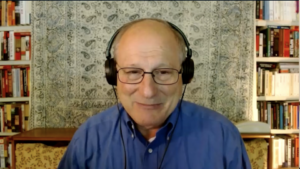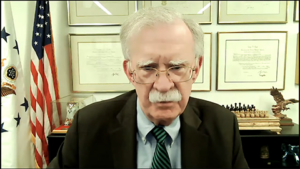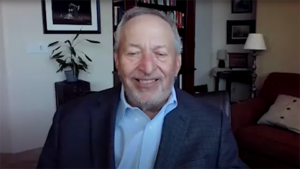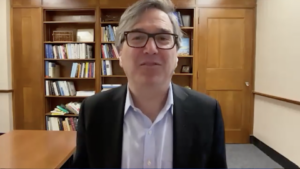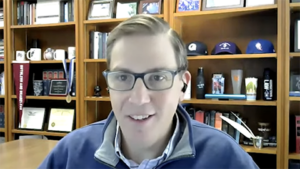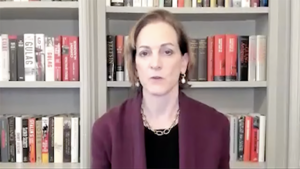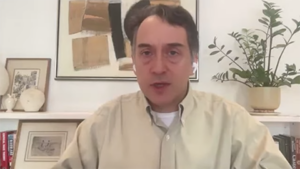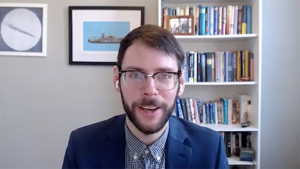In a recent law review article, University of Chicago law professor William Baude writes, "After the 2020 presidential election, the peaceful transfer of power can no longer be taken for granted.”
How well did our institutions respond to the challenges? What vulnerabilities in our electoral processes and loopholes in our laws represent the most critical threats for the future?
In this Conversation, Baude shares his perspective on the 2020 presidential election and its aftermath—and particularly the efforts in certain states and in Congress led by President Trump and those who fought for him to overturn the electoral victory of Joe Biden. Baude explains how these efforts to subvert the election create a dangerous precedent. Baude contends that the courts and other institutions resisted the attempt to overturn the election reasonably well. But, he argues, we cannot be complacent about concerted attempts to undermine the electoral process, and the threats to the rule of law in the years ahead.
BAUDE: There is more than a month between Election Day on November 3rd, which the Constitution calls the time of choosing electors, and then the day the Electoral College meets, so to speak. But they don’t all meet in one place. They collect in their individual states to cast their votes. The Constitution calls it the day on which they shall give their votes. During that six week period, that [could be] the time to try to lobby electors to be faithless, if you can do that. That was [what happened on a very small scale in 2016]. But that’s also the time where there’s some ambiguity about whether states can do more. The Constitution never explicitly says that electoral votes in the states have to be done by popular vote. That’s just become the custom, but it wasn’t always done that way; and textually, states could do other things. One of the first sets of pressure points was, if you’re a red state legislature and your electorate has just given a narrow victory to Joseph Biden, can you take it back? Can you pass a law saying, “Well, ultimately, we, the state legislature, are in charge. We’ve decided actually not to honor the results of the November election, but instead to pick the Republican slate?” That’s a legal ambiguity. I happen to think they can’t do that. That once election day has happened, that’s actually the time electors are chosen and by then it’s too late for the states to take it back. But the statutes Congress has passed [over the centuries], do have exceptions in them like if the election failed to happen, for instance, then the state is allowed to, as a backup, pick somebody. This was done envisioning there would be a snowstorm or something and nobody could get to the polls. But what if a state said: “Well, the election failed to happen because we think there was widespread fraud” or something, [that justified an opening to do that]. Now luckily, no actual state did that. There were members of various state legislatures who said we should do it. And had Pennsylvania and a couple of states gone with that and said, “We’re going to pass a new law rescinding the election and declaring our electoral votes go to Donald Trump,” we would have been in a much worse constitutional crisis.
BAUDE: It’s alarming. I don’t want to be an alarmist. I don’t want to say we almost had a coup in this country. There were still a lot of things that would have had to happen to go from senators and representatives objecting, to storming the capital, to get a full-on constitutional crisis or coup, so I think we still had plenty of safeguards between us and that. But we blew through a lot more of the safeguards then I think people came to expect.
BAUDE: I think it’s terrifying that one important way to be in good standing in the Republican party and to rise to prominence in the Republican party is, I guess, the big lie. It’s to say, “I believe Donald Trump won the election and that Republicans who failed to take his side, failed to find a way to keep him in office, have betrayed him. And I’ll be a true party loyalist.” I think it used to be, to be a party loyalist meant you did everything you could to win the election for your candidate, even when your candidate was flawed. If the new test to be a party loyalist is that you do everything you can to keep your candidate in power, even when they’ve lost the election, then we’ve lost the plot.
BAUDE: I’m least worried about the federal courts. And even the state courts [are probably less] active mischief makers in this process. The courts have had a doctrine, have had a series of doctrines for a long time that makes it really hard to convince the courts to change the results in the middle of the game and even harder to get them to agree to change the results after the fact. Basically, courts don’t ever order new elections in this country. They do that in some other countries, but they just basically never do that. Now people often on the Left complained about that and various situations because that could mean that voting rights get abridged and nothing happens. But it does mean that the courts are the least likely to be receptive [to efforts to overturn election results]. The courts may not save us to be clear. Like that means that if, because the courts leave everything alone, if you can successfully suppress the vote in some county or cause shenanigans to happen, the courts won't necessarily rush it to save it, but they're unlikely to be the ones to rush in and cause trouble.
BAUDE: President [Trump] wanted, as far as we can tell from the report, the Department of Justice to declare there was widespread election fraud in various places and start prosecuting people. He wanted the Department of Justice to file briefs on behalf of the United States saying that the election had been wrong, joining some of the state AGs who were [arguing this sort of thing]. And none of that happened. On the one hand, there were more people in the White House who were trying to make that happen than I would like. I would like to live in a world where everybody — the President says this, and his chief of staff and the White House counsel, everybody he talks to is just like, “Mr. President, we’re not doing that.” He had people saying yes. But he had people like Bill Barr, who, again, a lot of people have not been fans of, but people like Bill Barr saying, “Mr. President, we’re just not going to do that.” You have people in the Solicitor General’s Office refusing to take his calls or refusing to make it happen. The Department of Justice comes out basically unwilling to move on this.
BAUDE: We’ve been talking about this in asymmetric terms. “Of course, the Democrats would never do any of this. They all believe in the rule of law and apple pie and obey law.” But it’s really only so long that it can be true that one party refuses to accept the legitimacy of the constitutional system and the other doesn’t. Once both parties don’t, it’s not going to be possible to get anybody in either party to back down. So, if this keeps going on much longer, it’s going to get a lot worse.
